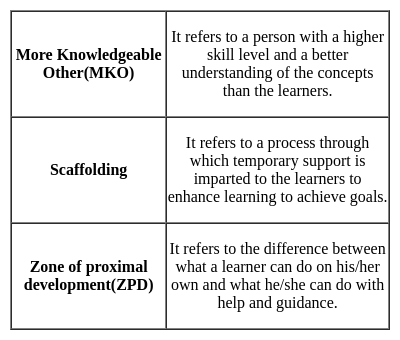Software Development Exam > Software Development Tests > English Pedagogy (Learning and Acquisition) - Software Development MCQ
English Pedagogy (Learning and Acquisition) - Software Development MCQ
Test Description
10 Questions MCQ Test - English Pedagogy (Learning and Acquisition)
English Pedagogy (Learning and Acquisition) for Software Development 2025 is part of Software Development preparation. The English Pedagogy (Learning and Acquisition) questions and answers have been prepared
according to the Software Development exam syllabus.The English Pedagogy (Learning and Acquisition) MCQs are made for Software Development 2025 Exam.
Find important definitions, questions, notes, meanings, examples, exercises, MCQs and online tests for English Pedagogy (Learning and Acquisition) below.
Solutions of English Pedagogy (Learning and Acquisition) questions in English are available as part of our course for Software Development & English Pedagogy (Learning and Acquisition) solutions in
Hindi for Software Development course.
Download more important topics, notes, lectures and mock test series for Software Development Exam by signing up for free. Attempt English Pedagogy (Learning and Acquisition) | 10 questions in 10 minutes | Mock test for Software Development preparation | Free important questions MCQ to study for Software Development Exam | Download free PDF with solutions
English Pedagogy (Learning and Acquisition) - Question 1
Which of the following statements accurately reflects language learning?
Detailed Solution for English Pedagogy (Learning and Acquisition) - Question 1
English Pedagogy (Learning and Acquisition) - Question 2
Who believes that the symbolic thoughts are pre-requisites of Language Learning?
Detailed Solution for English Pedagogy (Learning and Acquisition) - Question 2
English Pedagogy (Learning and Acquisition) - Question 3
Suman, a Class VII student, recently moved from Karnataka to Odisha. Kannada is her mother tongue, and she learns Hindi at school. By picking up Odia from her neighbors, she can now speak and read it. Based on Suman's language abilities, which statement is most likely true?
Detailed Solution for English Pedagogy (Learning and Acquisition) - Question 3
English Pedagogy (Learning and Acquisition) - Question 4
It is best to learn a second language:
Detailed Solution for English Pedagogy (Learning and Acquisition) - Question 4
Detailed Solution for English Pedagogy (Learning and Acquisition) - Question 5
English Pedagogy (Learning and Acquisition) - Question 6
According to some linguists, which of the following statements is true?
a. Language acquisition is a natural and unconscious process.
b. Language learning is a deliberate and conscious process.
c. Language learning is a natural and unconscious process.
d. Language acquisition is a deliberate and conscious process.
Detailed Solution for English Pedagogy (Learning and Acquisition) - Question 6
English Pedagogy (Learning and Acquisition) - Question 7
One of the main challenges of language learning in an inclusive classroom is—
Detailed Solution for English Pedagogy (Learning and Acquisition) - Question 7
English Pedagogy (Learning and Acquisition) - Question 8
Language acquisition is the result of deliberate and unconscious effort for a better understanding of foundational skills of language. Do you agree or disagree with the above statement?
Detailed Solution for English Pedagogy (Learning and Acquisition) - Question 8
English Pedagogy (Learning and Acquisition) - Question 9
What is the most important factor in learning a language from Vygotsky's point of view?
Detailed Solution for English Pedagogy (Learning and Acquisition) - Question 9
Detailed Solution for English Pedagogy (Learning and Acquisition) - Question 10
Information about English Pedagogy (Learning and Acquisition) Page
In this test you can find the Exam questions for English Pedagogy (Learning and Acquisition) solved & explained in the simplest way possible.
Besides giving Questions and answers for English Pedagogy (Learning and Acquisition), EduRev gives you an ample number of Online tests for practice
Download as PDF



















